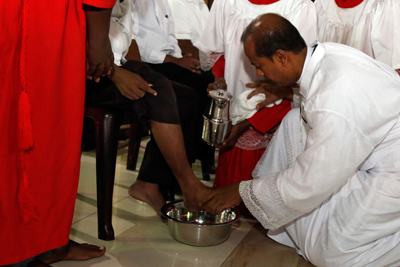Don’t cry for the crucified Christ, but stand up for the weak and down trodden

On Thursday, a priest washes the feet of the faithful in a church in Colombo, emulating Christ. Pic by M.A. Pushpa Kumara
He died for us……..He was killed.
Why?
This is what Fr. Lasantha de Abrew, a priest of the Jesuit Order, asked from the pulpit of a serene chapel in Colombo, just before Christians not only in Sri Lanka but across the world stepped into Holy Week.
Starting last Sunday, which was Palm Sunday and ending today, Easter Sunday, Christians attempt to re-trace the last week on earth of the life of their beloved Jesus Christ.
Welcomed as a victor by the masses who laid down palms as Jesus rode into Jerusalem ‘triumphantly’ on a donkey, Holy Week would quickly and tragically telescope into Holy Thursday where He sat down to the Last Supper with His disciples and established the sacrament of Holy Communion, followed by Good Friday when He was subjected to the cruellest of tortures including scourging and having a crown of thorns hammered into His head while being taunted and spat on and finally crucified between two thieves. It is on Easter Sunday that He rises in glory after His resurrection.
It was during the Last Supper, just before the Passover Festival, when Jesus knew that “the hour had come” that He expounded the new Commandment of Love – “Love one another as I have loved you”, says Fr. Lasantha, the Parish Priest of humble and rural Hingurakgoda.
And last Saturday, he shakes the complacency of those gathered in the chapel with searing questions – is it adequate just to attend mass, do the Way of the Cross, while lamenting before the 14 stations of agony of Christ on His final journey up Calvary, battered, bruised and bloodied, before being nailed to the cross?
“No,” is Fr. Lasantha’s resounding answer. “There is no need to mourn and cry for Jesus. The need is to get out of your comfort zone and follow Christ in defending the weakest of the weak and standing up for what is right even though in its wake would follow persecution,” he says.
For the youth of his parish, Fr. Lasantha’s ‘Way of the Cross’ has been, pointing them in the direction of the poorest of the poor of Hingurakgoda. This week they lent helping hands to clean up the homes of two impoverished families, for truly they are the ‘brothers and sisters’ that Jesus advocated that Christians should help. These families, both Buddhist, come mid-April, would then have a more joyful Sinhala and Tamil New Year.
The message of Easter for me is the “victory of faithfulness”, says Fr. Lasantha when we contact him this week.
“Jesus was faithful to His Father, to strong values and also to the duty entrusted to Him to promote the ‘Kingdom Project’ and the new Commandment of Love,” he says, explaining that this project was to show, act and imbibe the values set out by God the Father that we are God’s creation and children and we should all live as brothers and sisters of one family.
This was the purpose of Jesus’s life, whatever He did, whether preaching or facing the challenges posed by religious and political leaders. His ‘loving’ adherence to the Kingdom Project was evident when He cried, mourned, consoled and even got angry when cleansing the temple and wielding a whip overturned the tables of the vendors and chased them away. He was being faithful to His calling, a calling set by God, during which He went against the negative values of the religious and political leaders of His time which were satanic, stresses Fr. Lasantha.
So on Good Friday, the clash between God’s values and the satanic (worldly) values of the then religious and political leaders who formed a nexus, came to a head, he points out, with Jesus being defeated – defeated by being crucified. Though all left Him and Jesus felt utterly and completely alone, experiencing even the absence of God (“My God, my God, why have You forsaken me,”), finally there is enlightenment where Jesus is confident that God is there (“I don’t see You but I know You are there,” Psalm 22).
But was the crucifixion defeat, asks Fr. Lasantha, replying it was only temporary. Victory and triumph follow three days later with the resurrection on Easter Sunday.
“Now, we need to ask ourselves, do we believe and live the ‘Good News’ that we are God’s children. Are we treating others as our brothers and sisters especially after 30 years of conflict and tension and hatred in more recent times in Ampara and Digana? Who are our brothers and sisters – are they people closest to us, our family, our kith and kin and friends or are they the forgotten, the marginalized and the weak of whatever community, caste, creed or social strata?” he asks.
Fr. Lasantha adds that without crying for the crucified Christ what we need to strive for is to be like Him, helping, without bias and discrimination, anyone who needs our help…….for the final checklist will be: When they were hungry, did you give them to eat; when thirsty did you give them something to drink; when naked did you clothe them; when they were sick did you look after them and when they were in prison did you visit? They would be the “least of my brothers and sisters” for if “you do unto them, you do unto Me”, as Jesus said.


